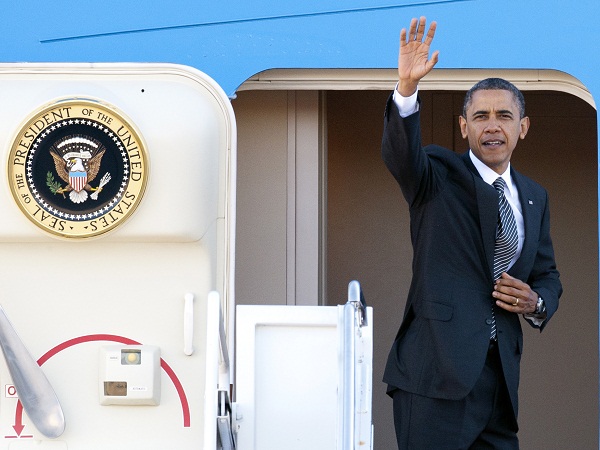
ASIA-BOUND. President Barack Obama waves as he boards Air Force One at Andrews Air Force Base, Maryland, Saturday, Nov. 17, 2012, en route to Southeast Asia to attend the Asean Summit. AP
BANGKOK – President Barack Obama arrives in Asia Sunday to intensify a US foreign policy pivot towards the fast-rising region on his first overseas trip since re-election, including a landmark visit to Myanmar.
He will be the first ever sitting US president to set foot in the long-time pariah, reflecting a dramatic thaw in relations brought about by sweeping political changes under a new reformist government.
Obama, who has dubbed himself America’s first “Pacific president”, will first touch down in Thailand, then make a one-day stop in Myanmar on Monday, before joining regional leaders in Cambodia for the East Asia summit.
He is making his fifth visit to Asia since taking office in 2009 and his second this year, a period otherwise consumed by heavy duty campaigning ahead of his poll triumph on November 6.
“His decision to travel to Asia so soon after his re-election speaks to the importance that he places on the region and its centrality to so many of our national security interests and priorities,” said Obama’s national security adviser Tom Donilon.
In a centerpiece of his foreign policy, Obama launched a so-called “pivot” to Asia, which included greater military cooperation with Australia, Thailand and Vietnam, and a plan to shift the bulk of the US navy to the Pacific by 2020.
The plan was implemented with some nations in the region looking for reassurance of a continued US presence as they warily eye rising China.
On his first stop in Thailand, Obama is scheduled to have an audience with King Bhumibol Adulyadej, the world’s longest-reigning monarch, who has suffered a period of recent ill health.
He will also hold talks with Prime Minister Yingluck Shinawatra.
Obama plans to discuss US cooperation with Thailand, a treaty ally, on counter narcotics issues, terrorism and trafficking, and will inaugurate a program to connect US and Thai universities.
On Monday, Obama will travel to neighboring Myanmar on a trip that would have been unthinkable just a year ago, but which has been opened up by the dramatic reform drive spearheaded by President Thein Sein.
Obama will hold talks with the former general, then travel to the lakeside residence of Aung San Suu Kyi, where his fellow Nobel peace laureate was held for long years of house arrest.
Suu Kyi has now entered parliament after her rivals in the junta relaxed their iron fists and made way for a nominally civilian government, albeit in a system still stacked heavily in favor of the military.
Some human rights groups said that Obama should have waited longer to visit, arguing that he could have dangled the prospect of a trip as leverage to seek more progress such as the release of scores of remaining political prisoners.
But officials say that Obama will use his trip to encourage the regime to double down on more reform, and that his influence could be important at a crucial moment in Myanmar’s emergence from decades of isolation and repression.
“The president has long indicated a willingness to engage countries that show concretely a will to reform, a will to make political progress,” said Samantha Power, a senior US official focusing on human rights.
“The reason we engage is not to reward, but to lock down progress and to push on areas where progress is urgently needed.”
To ease Obama’s passage, the United States on Friday scrapped a nearly decade-old ban on most imports from the country, after earlier lifting other sanctions.
Myanmar meanwhile last week pardoned hundreds more prisoners, but activists slammed the move, apparently involving mostly common criminals and not dissidents, as a ploy to curry favour before Obama’s visit.
The trip will be somewhat overshadowed by a wave of violence in Myanmar’s western Rakhine state between Buddhists and minority Rohingya Muslims, which the Organization of Islamic Cooperation Saturday branded as “genocide”.
Obama will also be the first sitting US president to visit Cambodia late on Monday for talks with Prime Minister Hun Sen, ahead of the East Asia summit.
Cambodia has been a staunch supporter of China and was seen as scuttling an initiative on resolving Asian maritime disputes when Secretary of State Hillary Clinton visited for regional talks in July.
On the summit’s sidelines, Obama will meet China’s outgoing premier, Wen Jiabao, and Prime Minister Yoshihiko Noda of Japan, whose relations with Beijing have frayed because of rival territorial claims.